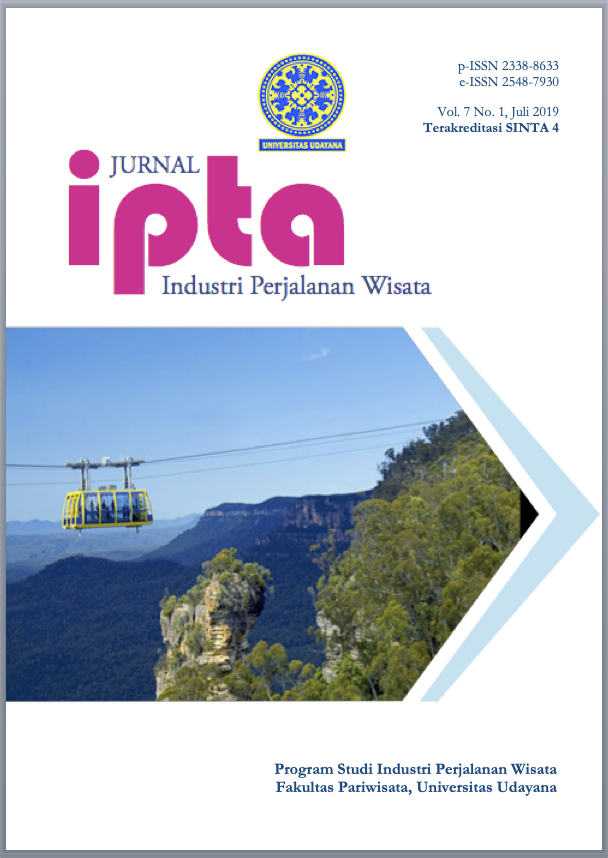COMMUNITY-BASED CULTURAL TOURISM AND LOCAL TOURISM IN THE GLOBALIZATION CENTER
Case Study in Kemiren Village, Banyuwangi, East Java
Abstract
Cultural tourism is an important issue in the global tourism industry, in a global context claimed to distort customs and traditions as local wisdom. The main problem to be answered is (1) What is the form of community-based Using cultural tourism ?, (2) How is the management of the global tourism market management? (3) What is the development strategy in global competition? The purpose of this study is to understand the forms of Using culture tourism, its management techniques, and its development strategies. Qualitative methods to answer the problems and objectives of this study involving a number of informants. Data collection is based on in-depth interview techniques, participatory observation, and document study. Qualitative data analysis through the stages of reduction, categories and classifications, determining themes, and drawing conclusions. The framework of cultural tourism theory in ecotourism, community-based cultural tourism, and management of cultural tourism management support analysis and writing. The results of this study are 2 forms of Using cultural tourism: tangible and intangible tours. Tangible tourist attraction objects are: Using home architecture, Using tourist parks, rice fields, Balai Paseban Buyut Chili, and culinary. Intangible attractions such as Using customs, life cycle ceremonies, and Using art. All forms of tourism are managed by the synergy of three components of Using tourism, namely: Using traditional institutions, Using tourism conscious groups (pokdarwis), and private parties. Using traditional institutions of representation of citizens of the Using community, Pokdarwis representation from the government, and private representation from investors. The form of development strategies such as the accessibility and amenities of tourism by the government, customs, traditions, and Using arts are synergies between local communities and government, marketing and human resources synergy tourism between local, government and private communities. Community and government participation is more dominant in its development. Internet support, and social media networks appear to play a lot in development, especially marketing, promotion, storytelling and service. The issue of conservation, preservation, and sustainability of Using tourism resources, has not been considered development because the economic aspects are the targets and objectives. In the future, the mainstreaming of this aspect is prioritized so that community-based Using cultural tourism and local wisdom can be dynamic in the global era.
Downloads
References
Brahmantya, Hanry. 2015., Proses dan Dilema Pengembangan Desa Wisata di Tengah Jantung Kota Banjarmasin dalam Membangun Pariwisata dari Bawah: Catatan Kritis Atas PNPM Pariwisata. Yogyakarta: Gadjah Mada University Press.
Boo, E., 1990.,Ecotourism: The Potentials and Pitfalls. Washington DC.: World Wildlife Fund.
Cebbalos, H. dan Lesurain. 1995., Ekoturisme sebagai Suatu Gejala yang Menyebar ke Seluruh Dunia, dalam Ekoturisme: Petunjuk untuk Perencana dan Pengelola. Lindberg, K. dan Hawkins, D.E.(ed). Jakarta: PACT dan Alami.
Creswell, John. W. 2014. Penelitian Kualitatif dan Desain Riset: Memilih Diantara Lima Pendekatan. Yogyakarta: Pustaka Pelajar.
Damanik, J. dan Weber, H.F., 2006,Perencanaan Ekowisata: Dari Teori ke Aplikasi. Yogyakarta: Andi Offset.
Damanik, J. 2015., Peran Negara dan Partisipasi Masyarakat dalam Pengembangan Pariwisata Perdesaan : Catatan Kritis Atas PNPM Pariwisata (sebuah pengantar), dalam Membangun Pariwisata dari Bawah: Catatan Kritis Atas PNPM Pariwisata. Yogyakarta: Gadjah Mada University Press.
Fandeli, C. 2002., Perencanaan Kepariwisataan Alam dalam Pengusahaan Ekowisata. Yogyakarta: Fakultas Kehutanan UGM.
______ . 2002., Pengertian dan konsep dasar pariwisata dalam Pengusahaan Ekowisata. Yogyakarta: Fakultas Kehutanan UGM.
______ . 2002., Pengembangan ekowisata dengan Paradigma Baru Pengelolaan Areal Konservasi dalam Pengusahaan Ekowisata. Yogyakarta: Fakultas Kehutanan UGM.
Kusworo, Hendrie Adjie. 2000., Pengembangan Wisata Pedesaan Tepi Hutan berbassi kerakyatan dalam Pngusahaan Ekowisata. Editor Chafid fandeli dan Mukhlison. Yogyakarta: Kerjasama Fakultas Kehutanan, UGM dengan Pustaka Pelajar dan Unit Konservasi Sumberdaya Alam DIY.
Marpaung, Fernando. 2015., Semangat Pengrajin Ulos dari Pesisir Danau Toba dalam Membangun Pariwisata dari Bawah: Catatan Kritis Atas PNPM Pariwisata. Yogyakarta: Gadjah Mada University Press.
Pearce, Douglas. 1989. Tourist Development. Second Edition. USA: Longman Grup Limited. New York AS.
Rindrasih, Erda. 2015., Menilik Pengembangan Desa Wisata di Taman Nasional, dalam Membangun Pariwisata dari Bawah: Catatan Kritis Atas PNPM Pariwisata. Yogyakarta: Gadjah Mada University Press.
Republik Indonesia. 2009., Pengembangan Desa Wisata sebagai Daya Tarik Wisata Berbasis Komunitas. Departemen Kebudayaan dan Pariwisata. Ditjen Pengembangan Destinasi. Jakarta (Laporan tidak terpublikasi).
Western, D., 1997., Memberi Batasan Tentang Ekotourisme. North Bennington Vermont: Ecotourism Society.
Wulandari dan Titik Sumarti, 2011, “Implementasi Manajemen Kolaboratif Dalam Pengelolaan Ekowisata Berbasis Masyarakat”, Sodality: Jurnal Transdisiplin Sosiologi, Komunikasi, dan Ekologi Manusia, Vol. 5, No. 1, April 2011, hlm. 32-50.
World Wide Fund for Nature (WWF Indonesia). 2009., Prinsip dan Kriteria Ekowisata Berbasis Masyarakat. Jakarta: Departemen Kebudayaan dan Pariwisata dan WWF-Indonesia.





